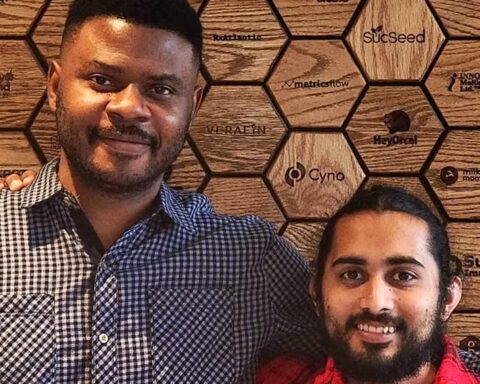#JeSuisCharlie
#IAmBaga
Both powerful hashtags. Both ways for people all around the world to express public outcry over the mass killings of people in France and Nigeria respectively. But, only one garnered millions of social media posts. The question that many people have taken to the Twitter verse with is: why? According to one Canadian expert, it has a lot to do with the mainstream media’s need to present a contrast between the forces of good and evil.
“In the Nigerian case that dichotomy is not clear-cut,” said Dr. Tope Oriola, an assistant professor at the University of Alberta, during an event held recently at Carleton University titled “Boko Haram in Nigeria: A Critical Roundtable”. “There are really no good guys. There are only bad guys and less bad guys. And so how do you pick sides? How do you frame what is going on in terms of the chaos there?”
Oriola, joined by Carleton University professors Dr. Pius Adesanmi and Dr. Nduka Otiona, aimed to provide context to the lack of mainstream coverage and understanding of Boko Haram, an extremist group that has claimed over 5,000 lives in northern Nigeria since its emergence in 2002. Perhaps the under reporting of this more than decade long turmoil was most apparent in the aftermath of the killings in Paris at the beginning of this year – claiming the lives of 12 journalists at the Charlie Hebdo publication – which received considerably more media attention.
In both instances, radicals with similar ideologies attacked the cities, however, the global reaction to each was quite different.
At the same time the world, and the media, was fixated on Paris, Boko Haram made its way through Baga, a city in northeast Nigeria, murdering 2,000 people in what Amnesty International described as the “deadliest massacre” in the group’s history. The attack began on January 3 (Hebdo shooting happened on the 7th), lasting almost an entire week as the extremist organization ploughed through the city, leaving a trail of bodies behind and displacing thousands of people from their homes.
In both instances, radicals with similar ideologies attacked the cities, however, the global reaction to each was quite different.
Forty world leaders marched in Paris. Protests were held in solidarity with Charlie Hebdo. Hashtags trended globally. The world expressed outrage over the events. However, the attention to the massacre of women and children in Baga, Nigeria paled in comparison. The panel presented various theories as to why this was.
Media Power
According to Oriola, the shooting in Paris held importance because of its unusualness. The frequency of the attacks by Boko Haram has reduced its level of extraordinariness, in turn, reducing the news value of what is going on, despite the shock of the recent mass killings. If what happened at Charlie Hebdo were to occur often in France, it would become stale news as well. The sheer volume, Oriola argued, is difficult to keep up with.
“It is epic displacement of priority to focus on under-representation of Boko Haram incidents in the world media rather than finding solutions to the problem.” – Dr. Tope Oriola
Further to that though, is the role of the colonial mentality in the coverage of the tragedies in France and Nigeria. The colonizing country validates the worth of the colonized subject, he explained. In order for the world to pay attention, the countries that hold media power – the west – need to deem it important enough. The hegemony of global media lies quite obviously in the hands of the west, in turn influencing the coverage of certain issues over others, Oriola explained, though he pointed out that he does not believe this is driven by racism.
“Valuing the lives of Nigerians begins with ensuring provision of security, a decent living standard, education and other basic infrastructure,” he added. “It is epic displacement of priority to focus on under-representation of Boko Haram incidents in the world media rather than finding solutions to the problem.”
Oriola’s last argument shifted the perspective of Boko Haram from being an international responsibility, to being, first and foremost, a national one. The emergence of Boko Haram didn’t happen overnight. After its establishment in 2002, it existed as a local organization for a few years until mobilizing in 2009, seeking support from partners across the Sahel, growing and strengthening in numbers since that time. This brings into question why this extremist group hasn’t been dealt with before becoming a threat to national security.
A Country Divided
Adesanmi explained the issue as being rooted in a lack, or “absence of national or regional will.” Many of Boko Haram’s young recruits come from northern Nigeria, where the region suffers from a lack of socioeconomic benefits that the south or the rest of the country enjoy.
Understanding the longstanding disconnect between the northern region and the rest of the country and its residents helps to contextualize the lack of concern and response to Boko Haram, Adesanmi said. The lack of a unified, national identity, in a sense, leads the rest of the country and the government to become disengaged with the pressing issue of Boko Haram.
“Boko Haram or no Boko Haram – there is no regional sense of feeling. The absence of a national will and the absence of a regional will combine to exacerbate the absence of a political will.” – Dr. Pius Adesanmi
Adesanmi also argued that the lack of regional will and the divide between Anglophone and Francophone countries within West Africa are both issues in this conflict. Take, for example, Yayi Boni, president of the West African nation, Benin. In a photo that went viral online, he was seen weeping over the killings of Charlie Hebdo staff, and on the day he flew out of Cotonou to France, Boko Haram killed 2,000 West Africans. Yet, as of now, he has still not released a statement about the Baga massacre.
“Is there a pan-Nigerian structure of feeling, of ownership, of this crisis in a fundamental sense?” asked Adesanmi. “Boko Haram or no Boko Haram – there is no regional sense of feeling. The absence of a national will and the absence of a regional will combine to exacerbate the absence of a political will. All three of these should be taken into consideration when discussing Boko Haram.”
As Boko Haram continues to strengthen and claim lives, the issue is hardly black and white. According to Adesanmi the discussion must be had regionally as well as internationally. As he explained, understanding the circumstances that created this extremist group, the vulnerable area of northern Nigeria exploited by Boko Haram, and the disconnect between the people of northern Nigeria and the rest of the world lie is crucial in this discussion.
“The inability to comprehend the character of the group is at the core of stopping Boko Haram,” said Otiono. “This delay in understanding Boko Haram is related to the delay in containing it too.”




